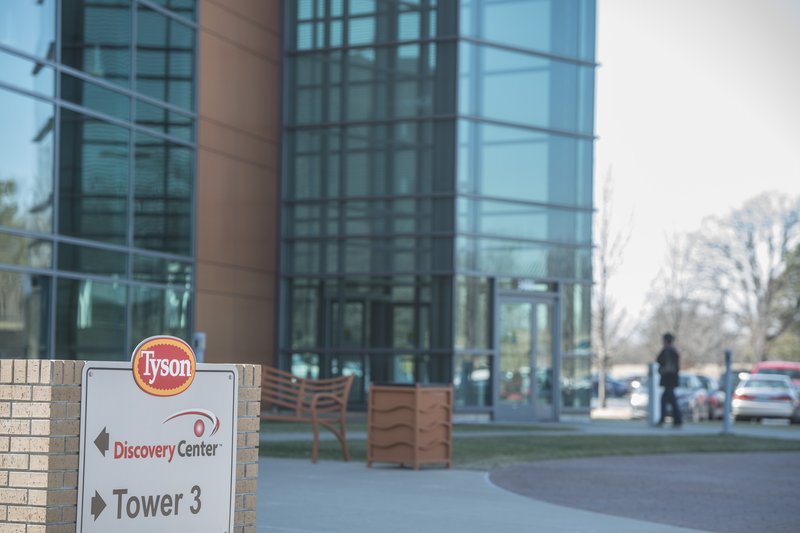SPRINGDALE -- Dawn and the start of her 12-hour shift at one of Tyson Foods' poultry plants were about two hours away when Irma Gonzalez peered through pink-rimmed glasses at several worksheets on English.
Her brow furrowed as she painstakingly sounded out questions about reading grocery prices and filling out personal checks, basic pieces of everyday adult life. Gonzalez, a 57-year-old grandmother, dropped out of school in Mexico almost 50 years ago after her parents died. She could barely read Spanish for most of her life, never mind English, and doubted she ever would.
Gonzalez still leans mostly on Spanish after almost a year of these 4:30 a.m. classes with an instructor from the Ozark Literacy Council. But she can make doctor appointments, greet co-workers and understand more discussions in English, which makes life on and off the clock less anxious, she said Wednesday.
Gonzalez is one of more than 500 Tyson workers in Northwest Arkansas who have taken English as a second language, GED, citizenship and other classes a few times a week before or after their shifts. The company announced this week that it plans to expand the year-old Upward Academy program to two dozen plants and 20,000 employees across the state in the coming months and eventually to other states.
The Springdale-based food company has about 97,000 employees working in plants and offices in 28 states, according to its website.
"The program got started sort of out of my involvement with team members on the line and trying to solve problems, to help them bring stability into their lives," said Kevin Scherer, a Tyson chaplain and the program's director. "It's about actually surviving day to day."
The region and state's Hispanic and Pacific Islander populations in recent years have flocked to companies like Tyson and George's Inc., though many have gone into services or professional occupations, as well. Roughly one in three of Northwest Arkansas' production or transportation workers belong to those two categories, twice their share of the metropolitan area's population, according to U.S. Census Bureau estimates.
Not all are immigrants, but almost half report speaking English less than "very well," the census reported in 2015. Immigrants from Southeast Asia, the Middle East and elsewhere also join them. Signs and fliers on the walls of the break room where Gonzalez and her fellow participants study are in English, Spanish and Vietnamese.
Letters from school, forms at the doctor's office, setting up checking accounts and buying groceries all require a grasp of English and American customs, Scherer said, so Tyson partnered with nonprofits the Ozark Literacy Council, Legal Aid of Arkansas, Cisneros Center for New Americans and other groups to provide education in those areas.
"They're really our target population of people who are in the most need of our services," said Margot Lemaster, the literacy council's executive director. "It's a model that I think could be really effective in the future because it makes it really convenient with the employees."
Scherer expected about a dozen employees per plant to be interested at first, but more than 10 times as many expressed interest just at Gonzalez's plant off of Thompson Street, Scherer said.
Government and private grants for adult education to the partner nonprofits help support the program. The Arkansas Department of Career Education will help Tyson connect to other education services as it spreads the academy, said Trenia Miles, the department's deputy director of adult education.
"We're very excited about the partnership," she said of the program, calling it an opportunity to expand education in a business-friendly way.
Tyson reports all or most participants are more satisfied at work and are more comfortable seeking out other health or social services in the community, and the academy could help with career advancement, Scherer said. It should also benefit the company by helping participants miss less work and stay in their jobs longer, Scherer said, though those results were never the priority.
"They're really set on bringing an increase to the employee," encouraging education and general well-being, said Patrick Boaz, who runs Chikin Melele, a Marshallese-language newspaper in Northwest Arkansas, and has helped recruit people for Tyson's classes. "They have good intentions."
Brandi Fernandez, Gonzalez's instructor with the literacy council, also teaches other Spanish speakers, a Vietnamese man and a Marshallese woman. She said her students help one another out during class and eat lunch at work together, breaking through cultural barriers that often separate employees. One will soon be able to advance to GED classes.
"They're so much more confident," Fernandez said of her group.
Business on 03/02/2017
